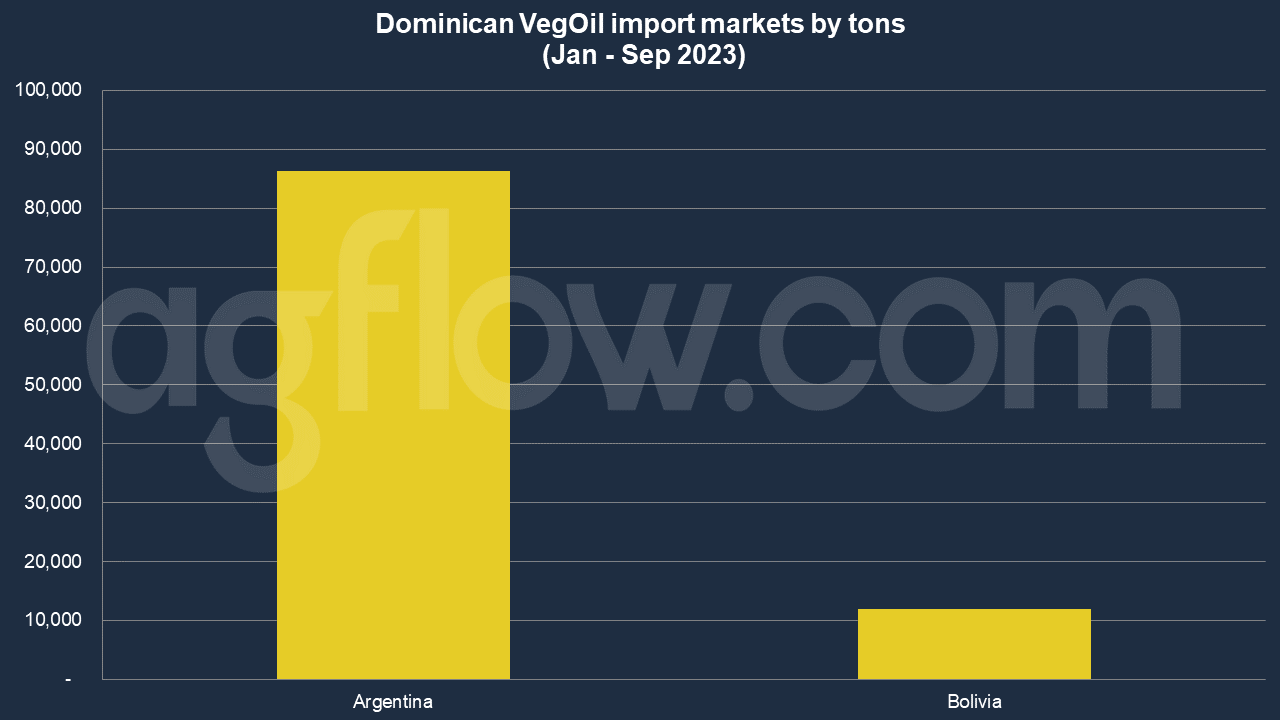The Dominican VegOil Imports: Low-Cost LATAM Players Pushes the US
Talk to our team about AgFlow's offering →
Reading time: 2 minutes
As the global market for agricultural commodities continues to expand, nations are engaging more actively in the trading sphere. The Dominican Republic, an island nation traditionally known for its vibrant culture and tourism, is no stranger to this movement. Specifically, let’s delve into the intriguing world of Dominican vegetable oils trade and imports from January to August 2023.
According to AgFlow data, Dominican imported 86,360 tons of Vegetable Oil from Argentina in Jan – Sep 2023, followed by Bolivia (12,000 tons). Total imports hit 98,360 tons. Average volume of shipments was 10,928 tons. U.S. soybean oil exports to the Dominican Republic also declined to $59 million in 2022; a 6% decrease from $63 million exported in 2021. The decline is explained by increased competition from lower cost Soybean oil sourced from South America. In 2019, the Soybean oil consumption in Dominican Republic amounted to 170 thousand metric tons, up from two consecutive years of 165 thousand metric tons consumed.

Vegetable Oils: What’s the Hype?
First and foremost, why vegetable oils? Is there an underlying narrative, or is it just the ebb and flow of commerce? To answer that, consider this analogy: Just as the human body requires a variety of nutrients to function optimally, the global economy demands a diverse range of commodities. Among these, vegetable oils are like a lifeblood. They play a pivotal role in cooking, manufacturing, and even as biofuel. For the Dominican Republic, this means tapping into a resource that promises economic growth and sustainability.
A Deep Dive into Dominican Trade Dynamics
So, how has the Dominican Republic been faring in this sector? Between January and August 2023, we noticed several factors influencing the vegetable oils trade:
- Local Production versus Imports: A perpetual challenge for nations is balancing cultivating local production and relying on imports. While local production aids in job creation and boosts the economy, the Dominican soil and climate might not be conducive to producing all types of oils. Hence, the need for imports.
- Quality Over Quantity: Is importing premium oils at a higher price or more affordable ones in larger quantities is more beneficial? The former approach targets a niche market, while the latter saturates the general populace. The tradeoffs here are evident – while premium oils may fetch a higher price, affordable ones ensure wider usage.
- External Factors: International politics, trade embargoes, and environmental concerns have made the market more volatile than ever. For instance, fluctuating global oil prices directly impact the cost of vegetable oils.
- Sustainability Concerns: With the growing emphasis on green practices, is the Dominican Republic poised to shift towards sustainable oil production and import methods? This question is not just about ecology but also about long-term economic viability.
Challenges on the Horizon
Navigating the intricate pathways of trade and imports is akin to solving a jigsaw puzzle where every piece has multiple right spots. Some of the significant challenges include:
- Balancing the act between sustaining local oil producers and meeting the nation’s demand through imports.
- Adapting to global price changes and market dynamics while ensuring the local economy doesn’t suffer.
- Adopting sustainable practices that might initially seem more expensive.
Wrapping Up
Isn’t it fascinating how a topic as seemingly straightforward as the Dominican vegetable oils trade can unravel into a web of complexities, tradeoffs, and decisions? As we’ve observed, the journey from farm to fryer or factory isn’t as linear as one might think. For professionals in the agricultural commodity industry, understanding these nuances is crucial. And for the rest of us? Well, the next time you use vegetable oil, remember the vast and intricate global tapestry that brings it to your table.
In conclusion, as the Dominican Republic charts its course in the vegetable oils sector, one thing is certain: the journey, filled with its challenges and opportunities, will be as enriching as the oils themselves.
Try AgFlow Free
Access Free On Updates for Corn, Wheat, Soybean,
Barley, and Sunflower Oil.
No Credit Card Required & Unlimited Access In Time

